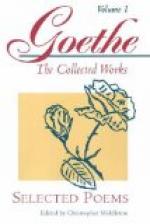Wille wo wo wo!
Wito hu!
I knew them all; ay, I knew them straight;
First, Anna, then Ursula, Eve, and Kate,
And Barbara, Lizzy, and Bet as well;
And forming a ring, they began to yell:
Wille wau wau wau!
Wille wo wo wo!
Wito hu!
Then call’d I their names with angry threat: “What wouldst thou, Anna? What wouldst thou, Bet?” At hearing my voice, themselves they shook, And howling and yelling, to flight they took.
Wille wau wau wau!
Wille wo wo wo!
Wito hu!
1772. ----- The destruction of Magdeburg.
[For a fine account of the fearful sack of Magdeburg, by Tilly, in the year 1613, see SCHILLER’s History of the Thirty Years’ War.]
Oh, Magdeberg the town!
Fair maids thy beauty crown,
Thy charms fair maids and matrons crown;
Oh, Magdeburg the town!
Where all so blooming stands,
Advance fierce Tilly’s bands;
O’er gardens and o’er well—till’d
lands
Advance fierce Tilly’s bands.
Now Tilly’s at the gate.
Our homes who’ll liberate?
Go, loved one, hasten to the gate,
And dare the combat straight!
There is no need as yet,
However fierce his threat;
Thy rosy cheeks I’ll kiss, sweet pet!
There is no need as yet.
My longing makes me pale.
Oh, what can wealth avail?
E’en now thy father may be pale.
Thou mak’st my courage fail.
Oh, mother, give me bread!
Is then my father dead?
Oh, mother, one small crust of bread!
Oh, what misfortune dread!
Thy father, dead lies he,
The trembling townsmen flee,
Adown the street the blood runs free;
Oh, whither shall we flee?
The churches ruined lie,
The houses burn on high,
The roofs they smoke, the flames out fly,
Into the street then hie!
No safety there they meet!
The soldiers fill the Street,
With fire and sword the wreck complete:
No safety there they meet!
Down falls the houses’ line,
Where now is thine or mine?
That bundle yonder is not thine,
Thou flying maiden mine!
The women sorrow sore.
The maidens far, far more.
The living are no virgins more;
Thus Tilly’s troops make war!
-----
Familiar songs.
------ What we sing in company Soon from heart to heart will fly. -----
The Gesellige Lieder, which I have angicisled as above, as several of them cannot be called convivial songs, are separated by Goethe from his other songs, and I have adhered to the same arrangement. The Ergo bibamus is a well-known drinking song in Germany, where it enjoys vast popularity.
On the new year.
[Composed for a merry party that used to meet, in 1802, at Goethe’s house.]
Fate now allows us,




